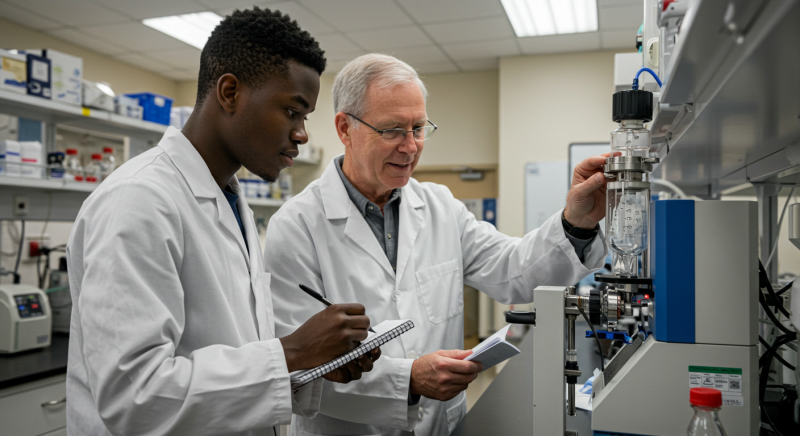The Struggling Student’s Path to Financial Independence
Chioma stared at her university acceptance letter with mixed emotions. The joy of being admitted to the University of Lagos was quickly overshadowed by a nagging question: “How will I pay for this?” As the eldest of four siblings from a modest home in Enugu State, the financial burden of higher education seemed insurmountable. Her parents had saved diligently but could only cover about half of her expenses. The rest would be her responsibility.
This is the reality for millions of African students who find themselves caught between their academic aspirations and financial constraints. The pursuit of higher education often places significant strain on family resources, forcing many talented individuals to abandon their academic dreams. However, a growing solution has emerged across the continent: work-study programs in Africa are providing students like Chioma with viable options to fund their education while gaining valuable work experience.
Key Takeaways
Work-study programs in Africa represent a significant opportunity for students to finance their education while acquiring practical skills. These programs typically involve part-time employment opportunities within educational institutions or with partner organizations where students work a set number of hours weekly in exchange for financial compensation that helps offset educational expenses. The benefits extend beyond mere financial assistance, as participants develop professional skills, build networks, and enhance their employability after graduation.
African universities are increasingly incorporating these programs into their institutional frameworks, recognizing their value in promoting educational access and addressing financial barriers to higher education. For many students across the continent, work-study programs in Africa provide the critical bridge between academic aspirations and financial reality, allowing them to pursue their educational goals without incurring overwhelming debt.

Understanding Work-Study Programs in Africa
Work-study programs in Africa are designed to provide students with opportunities to earn income while pursuing their academic degrees. Unlike in Western countries where such programs are often centralized and government-funded, work-study programs in Africa typically operate at the institutional level, with universities creating their own frameworks for student employment.
The concept is straightforward: students work part-time, usually between 10 to 20 hours per week, in various capacities across campus or with affiliated organizations. These positions can range from administrative support and library services to research assistance and campus maintenance. In exchange, students receive compensation that helps cover tuition fees, accommodation, books, or living expenses.
According to data from the African Higher Education Observatory, approximately 40% of universities across the continent now offer some form of work-study arrangement, though the structure and compensation vary significantly by institution and country. This growth reflects the recognition that work-study programs in Africa serve as an essential component of financial aid packages for students with demonstrated need.
Dr. Nnamdi Okonkwo, education policy analyst at the Centre for Education Development in Nairobi, explains: “Work-study programs in Africa have evolved as a pragmatic response to the continent’s unique educational challenges. Unlike scholarship systems that can only support a limited number of students, work-study initiatives create scalable opportunities for financial assistance while simultaneously developing students’ professional competencies.”
Top Universities Offering Work-Study Programs in Africa
University of Cape Town (South Africa)
The University of Cape Town (UCT) operates one of the continent’s most established work-study programs, known as the Student Work Program. This initiative employs over 3,000 students annually across various departments. Positions include research assistants, tutorial facilitators, administrative support staff, and IT helpdesk consultants.
Students can work up to 20 hours per week during term time and full-time during holidays. Compensation ranges from R65 to R120 per hour depending on the position and required skills. UCT’s program prioritizes students receiving financial aid, ensuring that opportunities reach those with the greatest need.
To apply, students must:
- Be registered for full-time study at UCT
- Maintain satisfactory academic progress
- Complete the online application through the UCT Student Portal
- Submit a CV and academic transcript
- Attend an interview if shortlisted
For more information, students can visit the UCT Student Work Program website.
University of Lagos (Nigeria)
The University of Lagos (UNILAG) Work-Study Scheme was established to assist financially challenged students while providing valuable work experience. The program accommodates approximately 500 students each academic year, placing them in positions across academic departments, the university library, ICT centers, and administrative offices.
Participants work 8-12 hours weekly and receive stipend payments calculated to cover approximately 40% of their tuition fees. What makes UNILAG’s program distinctive is its emphasis on connecting students with positions related to their field of study, enhancing the educational value of the work experience.
Application requirements include:
- Proof of financial need
- Minimum CGPA of 2.5
- Recommendation from the student’s department
- Completion of at least one semester at UNILAG
- Interview with the Work-Study Committee
More details can be found on the UNILAG Student Affairs Division page.
University of Ghana (Ghana)
The University of Ghana’s Student Work-Aid Programme employs nearly 1,000 students each year, making it one of West Africa’s largest work-study initiatives. Students work in the university libraries, laboratories, gardens, residential halls, and sports facilities.
The program typically provides stipends covering approximately 30-50% of accommodation costs or equivalent value toward tuition. A unique feature of Ghana’s approach is the incorporation of financial literacy training for all participants, ensuring students develop money management skills alongside their income.
To qualify, students must:
- Demonstrate financial need through the university’s assessment process
- Have completed at least one semester of study
- Maintain a minimum CWA of 2.5
- Commit to working 10-15 hours weekly
- Provide two academic references
Students interested in the program should contact the University of Ghana Student Financial Aid Office.
Strathmore University (Kenya)
Strathmore University in Nairobi operates an innovative work-study program that combines on-campus employment with mentorship opportunities. Approximately 600 students participate annually, working in positions across academic departments, the university’s various research centers, and administrative offices.
Students earn between KES 150-250 per hour depending on their role and experience level. What distinguishes Strathmore’s program is its explicit focus on building professional skills and workplace readiness. Each work-study position includes defined learning outcomes and regular performance evaluations.
Application criteria include:
- Demonstrated financial need
- Minimum cumulative average of B-
- Completion of at least one semester
- Department approval
- Successful interview with potential supervisor
Further information is available on the Strathmore University Financial Aid site.
American University in Cairo (Egypt)
The American University in Cairo (AUC) operates a comprehensive work-study program that serves approximately 800 students annually. Positions span academic departments, research centers, administrative offices, and campus services.
Students can work up to 15 hours weekly during the semester and 35 hours during breaks, earning between EGP 40-75 per hour. AUC’s program is noteworthy for its tiered approach, offering entry-level positions for newcomers and advanced opportunities with increased responsibilities and higher compensation for experienced participants.
Eligibility requirements include:
- Current enrollment in a degree program
- Demonstrated financial need
- Minimum GPA of 2.0
- Completed application form and resume
- Department interview
More details can be found on the AUC Work-Study Program page.
Benefits of Work-Study Programs in Africa
Work-study programs in Africa offer numerous advantages beyond the obvious financial support:
Financial Independence
The primary benefit is financial assistance that reduces the burden of educational expenses. According to research by the Association of African Universities, students in work-study programs are 35% less likely to discontinue their studies due to financial constraints compared to those without such opportunities.
“Work-study income often means the difference between completing a degree and dropping out,” notes Professor Aisha Mohammed of the University of Ibadan. “For many students, particularly those from rural or low-income backgrounds, these programs represent the only viable path to graduation without accumulating prohibitive debt.”
Skill Development
Work-study positions provide practical experience that complements classroom learning. Students develop transferable skills including time management, professional communication, teamwork, and problem-solving abilities. A 2023 survey by PwC Africa found that graduates with work-study experience were rated 27% higher on work-readiness by employers compared to those without similar experience.
Enhanced Employability
Participation in work-study programs in Africa significantly improves post-graduation employment prospects. According to data from the African Development Bank’s Education and Skills Development Division, graduates with work-study experience secure employment on average 4.2 months faster than those without similar experience.
Samuel Chukwu, a human resources director at a major telecommunications firm in Nigeria, explains: “When we review applications, candidates with work-study experience stand out. They’ve already demonstrated reliability, work ethic, and the ability to balance competing priorities—all highly valuable traits in any professional setting.”
Academic Integration
Many universities structure work-study programs to complement academic pursuits. Research assistantships, tutorial positions, and laboratory work often align with students’ fields of study, deepening their understanding of course material. Evidence from Makerere University suggests that students in field-related work-study positions achieve GPAs averaging 0.4 points higher than their peers.
Community Building
Work-study programs in Africa foster connections between students and the broader university community. Participants develop relationships with faculty, staff, and fellow students outside their immediate academic circles. These networks often prove valuable throughout their academic careers and beyond graduation.

Application Strategies for Work-Study Programs
Securing a work-study position in African universities often involves significant competition. Here are strategies to improve your chances:
Early Application
Most work-study programs have limited positions that fill quickly. Apply as soon as the application period opens, typically 1-2 months before each semester begins. Creating calendar reminders and setting up notifications for application periods can prevent missing these crucial deadlines.
Needs Assessment Preparation
Universities typically prioritize students with demonstrated financial need. Be prepared to provide comprehensive documentation of your financial situation, including family income, number of dependents, and other relevant circumstances. Honesty and transparency in this process are essential.
Dr. Fatima Nkrumah, financial aid coordinator at the University of Ghana, advises: “Students should thoroughly document their financial circumstances. This includes not only income statements but also explanations of any special circumstances that impact their ability to pay for education.”
Skills Inventory
Conduct a thorough assessment of your skills and experiences. Even if you lack formal work experience, volunteer activities, community involvement, and academic projects can demonstrate valuable capabilities. Consider creating a comprehensive skills inventory that maps your abilities to common work-study positions.
Department-Specific Applications
While most universities have centralized work-study application systems, many departments also maintain their own hiring processes for student workers. Contact departments related to your field of study directly to inquire about position openings, as these may offer more relevant experience and potentially higher compensation.
Professional Documentation
Prepare a professional CV and cover letter even if they’re not explicitly required. These documents should highlight relevant skills, academic achievements, and any previous work or volunteer experience. Tailor these documents for each position, emphasizing the specific qualifications that match the job requirements.
Balancing Work and Academic Responsibilities
Successfully managing work-study programs in Africa alongside academic commitments requires effective strategies:
Time Management
Effective scheduling is crucial for work-study success. Many students find that creating weekly schedules with dedicated blocks for classes, study time, work hours, and personal activities helps maintain balance. Digital tools like Google Calendar or dedicated student planning apps can help visualize and manage time commitments.
Adama Diallo, a successful work-study participant at Cheikh Anta Diop University in Senegal, shares: “I treat my work schedule with the same seriousness as my class schedule. By blocking off specific hours for each responsibility and including buffer time between activities, I’ve been able to maintain my academic standing while working 15 hours weekly.”
Communication with Supervisors
Most work-study supervisors understand that academics must remain the priority. Establish clear communication channels with your supervisor about your class schedule, examination periods, and major assignment deadlines. Many programs allow for reduced hours during examination periods if arranged in advance.
Academic Integration
When possible, seek work-study positions that complement your academic pursuits. Library positions might benefit humanities students, while laboratory assistantships could enhance learning for science majors. This alignment creates synergy between work and study rather than competition for your time and attention.
Regular Self-Assessment
Periodically evaluate how your work-study commitment is affecting your academic performance. If you notice declining grades or increasing stress, consider adjusting your work hours or seeking advice from academic advisors. Most programs would rather reduce hours temporarily than lose a valuable student worker to academic difficulties.
Challenges and Solutions
While work-study programs in Africa offer tremendous benefits, they also present challenges:
Insufficient Compensation
Many work-study positions offer modest stipends that, while helpful, don’t fully address financial needs. According to a 2023 survey by the African Student Alliance, only 23% of work-study participants reported that their earnings covered more than half of their educational expenses.
Solution: Students can supplement work-study income through academic scholarships, family contributions, or community sponsorships. Many universities also offer emergency funding for students facing unexpected financial hardships.
Limited Availability
The demand for work-study positions typically exceeds availability. At the University of Nairobi, for example, approximately seven students apply for each available position.
Solution: Universities are expanding programs by developing partnerships with private sector companies and NGOs to create additional off-campus work-study opportunities. Students can also explore departmental positions that may have separate allocation processes and different application timelines.
Workload Management
Balancing work responsibilities with academic demands can be challenging, particularly during examination periods or when major assignments are due.
Solution: Dr. Benjamin Kwame of the University of Ghana recommends: “Students should proactively communicate with their supervisors about academic pressure points in their semester. Most work-study programs can accommodate reduced hours during examination periods if arrangements are made well in advance.”
Relevance to Career Goals
Not all work-study positions align with students’ career aspirations or academic fields.
Solution: Even positions outside your field develop transferable skills valued by employers. Focus on developing and documenting these skills regardless of the specific role. Additionally, many universities allow students to transition between positions annually, providing opportunities to seek more relevant roles as they progress in their studies.
Future of Work-Study Programs in Africa
Work-study programs in Africa continue to evolve in response to changing educational and economic landscapes:
Technology Integration
Universities are increasingly leveraging technology to expand work-study opportunities. Virtual assistantships, remote research positions, and digital content creation roles allow students to work flexible hours while accommodating academic schedules. The COVID-19 pandemic accelerated this trend, with many institutions maintaining hybrid models even after returning to in-person instruction.
Industry Partnerships
Forward-thinking universities are developing partnerships with private sector companies to create off-campus work-study opportunities. These arrangements benefit students through higher compensation and more directly relevant experience, while partner companies gain access to talented potential recruits.
The University of Rwanda’s partnership with technology companies in Kigali Innovation City exemplifies this approach, placing students in part-time roles that often lead to full-time employment after graduation.
Entrepreneurship Integration
Some institutions are reimagining work-study to incorporate entrepreneurship support. Rather than traditional employment positions, these programs provide mentorship, seed funding, and structured time for students to develop their own business ventures while studying.
Ashesi University in Ghana has pioneered this approach with its Student Venture Incubator, which functions as an alternative to traditional work-study by supporting student-led businesses that generate income while developing entrepreneurial skills.
Policy Development
Educational policymakers across the continent are beginning to recognize the value of work-study programs in Africa for both educational access and workforce development. Several countries, including Rwanda, Ghana, and South Africa, have incorporated student employment initiatives into their national higher education strategies, with dedicated funding and policy frameworks.

Conclusion
Work-study programs in Africa represent a critical bridge between educational aspiration and financial reality for countless students across the continent. These programs not only provide essential financial support but also equip participants with professional skills, workplace experience, and valuable connections that enhance their academic journey and future employability.
As African universities continue to expand and refine their work-study offerings, more students will gain access to these transformative opportunities. For those currently facing the challenging balance between educational dreams and financial constraints, work-study programs offer a viable path forward—one that transforms financial necessity into a formative professional experience.
The story of Chioma, our student from the introduction, concluded with her securing a position in the University of Lagos library through the work-study program. This opportunity not only helped finance her education but also sparked an interest in information science that eventually shaped her career path. Like thousands of other students across Africa, she found in work-study not just financial support, but a formative experience that enriched her education beyond the classroom.
For African students navigating the complex intersection of academic ambition and financial reality, work-study programs in Africa offer not just income, but opportunity—the opportunity to stay in school, to gain experience, and to build foundations for future success.
Frequently Asked Questions
How many hours per week do students typically work in African work-study programs?
Most work-study programs in Africa limit students to 10-20 hours per week during academic terms. This restriction helps ensure that work responsibilities don’t interfere with academic progress. During vacation periods, many programs allow increased hours, typically up to 35-40 hours weekly, providing opportunities for additional income when academic demands are lower.
Are work-study positions available to international students studying in Africa?
Policies regarding international student participation in work-study programs vary by country and institution. Some universities extend work-study opportunities to all enrolled students regardless of nationality, while others restrict positions to domestic students. International students should consult their host institution’s international student office for specific regulations. In South Africa, for example, international students with valid study permits can generally participate in on-campus work programs, while Nigeria has more restrictive policies.
Can first-year students apply for work-study programs?
Many universities restrict work-study eligibility to students who have completed at least one semester or academic year. This policy allows students to adjust to university academic demands before taking on work responsibilities. However, some institutions do offer limited positions specifically for first-year students, typically with reduced hours and additional supervision. The University of Johannesburg, for instance, reserves 20% of its work-study positions for first-year students who demonstrate significant financial need.
How do work-study earnings affect scholarship eligibility?
Work-study earnings generally do not negatively impact scholarship eligibility at most African universities. These institutions typically consider work-study as part of the financial aid package rather than external income. However, policies vary by institution and scholarship program. Students receiving need-based scholarships should consult their financial aid office to understand how work-study income might affect their overall aid package. Many universities actually encourage the combination of scholarships and work-study to create comprehensive financial support.
What happens if my academic performance suffers while participating in a work-study program?
Most work-study programs in Africa include academic performance requirements, typically a minimum GPA or grade standard that participants must maintain. If performance falls below these thresholds, students usually receive probationary status with reduced work hours rather than immediate dismissal from the program. This approach allows students to refocus on academics while maintaining some financial support. Support services including tutoring and academic counseling are often made available to help students regain their academic standing.
READ MORE
